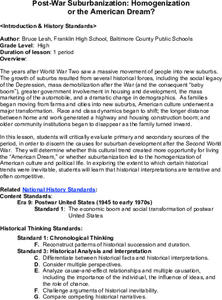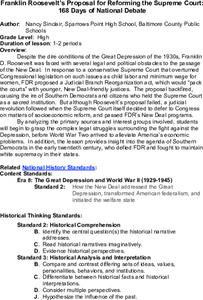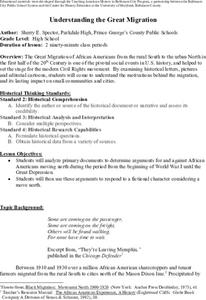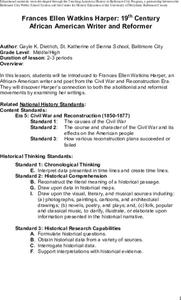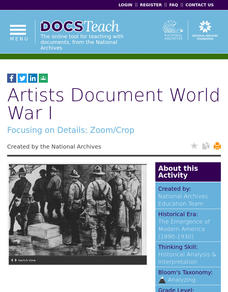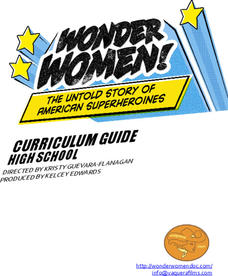DocsTeach
The War in Vietnam - A Story in Photographs
The Vietnam War was the first war to come into American living rooms with its images of American soldiers fighting in jungles far, far away. Young historians analyze and curate photos from the conflict, deciding how they would create a...
Center for History Education
African Americans and the Democratic Party
Why did African American voters switch from the Republican Party to the Democratic party during the Depression Era? That is the question young historians attempt to answer as they study primary source documents from the period. The focus...
Center for History Education
Contextualizing a Historical Photograph: Busing and the Anti-busing Movement in Boston
The anti-busing movement in Boston is the focus of a lesson that asks young historians to examine primary source documents to identify the causes and consequences of busing pupils from one area of the city to another in the attempt to...
Center for History Education
Post-War Suburbanization: Homogenization
The results of World War II made waves all the way to suburban life today. Examine the flight from the cities using images and documents from the 1950s building boom, including a quote analysis and political cartoons. The resource...
Center for History Education
Continuity or Change? African Americans in World War II
While World War II was a pivotal moment in history, historians debate its importance to the civil rights movement. Class members consider the implications of segregation and the war using a series of documents and a jigsaw activity....
Center for History Education
Franklin Roosevelt's Proposal for Reforming the Supreme Court: 168 Days of National Debate
Was it overreach or wise executive functioning? Scholars have long debated Franklin Roosevelt's court-packing scheme when he attempted to stack the court with justices friendlier to his New Deal measures. Now, learners pick up the...
Center for History Education
The Federal Theatre Project: Analyzing Conflict Among Relief, Art, and Politics in 1930s America
In the effort to soothe the suffering of the Great Depression, New Deal programs funded a variety of approaches - including a theater project that proved controversial! Using documents such as oral histories, as well as photographs of...
Center for History Education
Dust Bowl Story
Images of the Dust Bowl during the Great Depression are haunting in the suffering they show. Young historians use photographs—both iconic and lesser known—to tell about the human experience during this time. A series of photographs, as...
Center for History Education
Understanding the Great Migration
What would make someone leave home and travel thousands of miles to find another one? Young historians look at letters, demographic data, and artwork to answer the question for the Great Migration, or the movement of thousands of African...
Center for History Education
Frances Ellen Watkins Harper: 19th Century African-American Writer and Reformer
Although some African American abolitionists—such as Sojourner Truth and Frederick Douglass—are well known, others, like Frances Ellen Watkins Harper, remain in the shadows of history. Harper was a poet and activist who played an...
Center for History Education
Speaking Up and Speaking Out: Exploring the Lives of Black Women During the 19th Century
Young historians investigate the often-hidden history of free and enslaved African American women before the Civil War. Using a collection of primary and secondary sources, including speeches, diaries, and poems, they evaluate the often...
Center for History Education
Nineteenth Century Reform Movements: Women's Rights
It's hard to imagine a world where women were marginalized from the seats of power. Yet, there are women today who remember what it was like to not be allowed to vote. Using a DBQ of images and other primary sources, such as political...
DocsTeach
Bibb Mill No 1 Child Labor Photograph Discussion
There's no way a child can operate heavy machinery ... right? Pupils examine a photograph of a child operating a loom at mill to learn about child labor and its impacts. Prompts provoke thoughtful discussion or fuel a writing exercise.
DocsTeach
Environmental Case Study: Hetch Hetchy Valley
What is more important: building a new school or preserving a nature reserve? Keeping a natural area clean or providing clean drinking water to a city of millions? Young scholars weigh these questions—almost literally—using an...
DocsTeach
Chinese Exclusion Broadside Analysis
Racism against Asian American goes deep in American history. Using a broadside in favor of the Chinese Exclusion Act, class members examine clues—with key portions of the document blacked out—to better understand the roots of anti-Asian...
DocsTeach
Before and After Carlisle School
White reformers thought they were "killing the Indian" to "save the man." Native children were taken from their parents and placed at boarding schools, such as the Carlisle School. Using a comparative photo analysis of children before...
DocsTeach
Baseball on the World War I Homefront
Are sports essential to American life? Young historians ponder the question as they examine letters between the owner of the Boston Red Sox and Navy Secretary Franklin D. Roosevelt during World War I. The owner wanted two star players...
DocsTeach
Artists Document World War I
Drawings may be worth even more than a thousand words. Curious scholars query an artist's rendering of troops leaving a ship after they have arrived in Europe to fight in World War I. By zooming in and looking at the entire piece, class...
DocsTeach
President Reagan and the Cold War: Vision and Diplomacy
After years of boiling tension, the presidency of Ronald Regan and the rise of Mikhail Gorbechev paved a new way forward for diplomacy between the United States and the Soviet Union. Using primary source documents, including letters...
DocsTeach
Landing a Man on the Moon: President Nixon and the Apollo Program
Take the small step for man and giant leap for mankind with the Apollo astronauts using primary sources. Young historians explore the documents related to the American space program up through the lunar landing, including presidential...
DocsTeach
Analyzing Woodrow Wilson's Fourteen Points
The end of a war means the causes were resolved, right? Not for World War I. By examining Woodrow Wilson's Fourteen Points, budding historians consider imperialism, nationalism, militarism, and alliances, as well as Wilson's efforts to...
Angel Island Immigration Station Foundation
How Do Pictures Tell the Story of Angel Island?
Young historians learn more about the history of Angel Island Immigration Station through their analysis of primary source images. Guided by a list of inferential questions, scholars learn how to make and record observations on a...
Angel Island Immigration Station Foundation
The Chinese Exclusion Act
As part of a study of Angel Island Immigration Station, young historians examine the Chinese Exclusion Act of 1882, the first restriction on the United States immigration based on race and nationality. They complete a matrix identifying...
Vaquera Films
Wonder Women - The Untold Story of American Superheroines: High School Curriculum Guide
A 41-page curriculum guide tells the story of the untold stories of American Superheroines! Divided into three modules, the guide is designed to be used before, during, and after viewing the 2012 documentary Wonder Women! The Untold...





